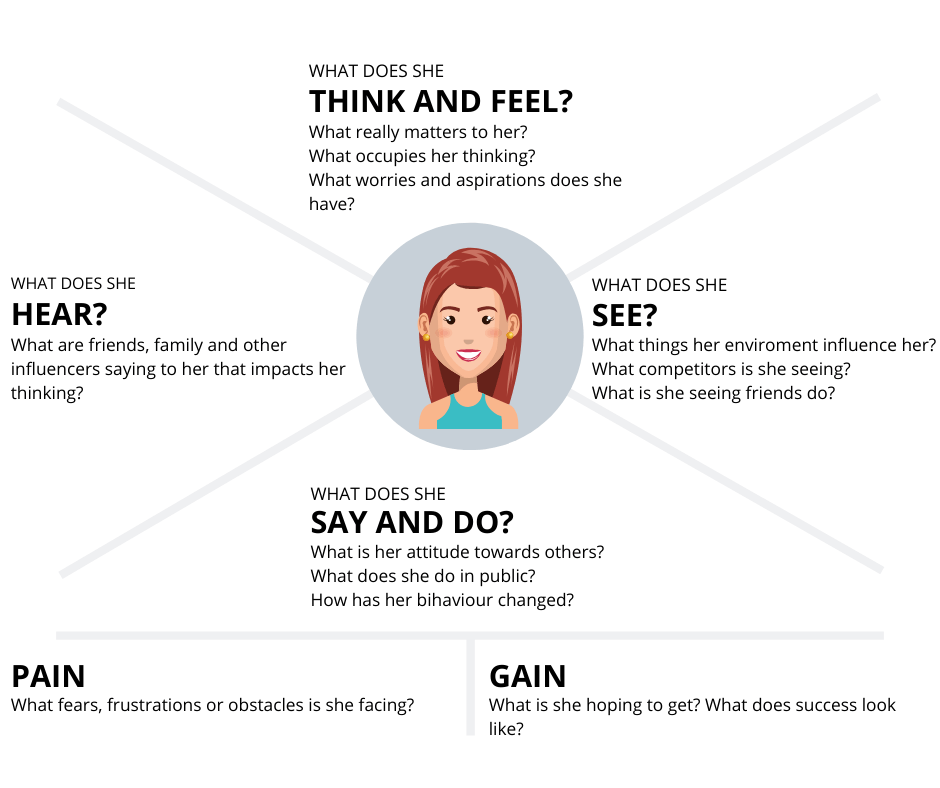The Ultimate Guide to Customer Empathy: Tips and Techniques

Customer empathy plays a critical role.
Why?
Simply because humans want human contact, that’s easy. We want someone empathetic who can help us.
High Customer Empathy leads to stronger financial performance, increased customer satisfaction, and customer loyalty.
In the past, empathy was considered an inborn trait that couldn’t be taught. Empathy is surely innate quality, but it is also learned in life through experiences.
Table of contents:
- What is Empathy?
- What is Customer Empathy?
- Types of Empathy
- Empathy or Sympathy?
- The Advantages of Customer Empathy
- Tips on How to Develop Your Empathy Skills
- Signs of Lack of Customer Empathy
- How to be Truly Empathetic as a Customer Service Rep
- How To Express Empathy if You Don’t Feel Empathetic
What is Empathy?
Empathy is the ability to step into the shoes of another person, aiming to understand their feelings and perspectives and to use that understanding to guide our actions.
It’s the link between self and others because it is how we understand what others are experiencing as if we are feeling it ourselves.
Empathy is what you experience when you see someone hit the pinky finger on the corner.

When you hit the pinky finger on the corner.
What is Customer Empathy?
Customer empathy means walking a mile in the shoes of your customers: feeling their pain, understanding their needs, what really matters to them, what worries and aspirations they have.
In the Customer Service, empathy is the possibility to fuel connection with the customer, it also provides an emotional bridge, enables the sharing of experiences, needs, and desires.
When you show deep empathy towards others, their defensive energy goes down and positive energy replaces it. That’s why being empathetic makes it easier for you to solve problems and deal with the customers.
Types of Empathy
There are 3 ways of looking at empathy.
First, there is Affective Empathy. This is the ability to share the emotions of others.
People with a high level of Affective Empathy are usually not big fans of horror movies. They feel scared or feel others’ pain strongly within themselves when seeing others scared or in pain.
There is also Cognitive Empathy, which is the ability to understand the emotions of others.
A good example is psychologists, who understand the emotions of their clients, but don’t really share them in a visceral sense.
At the end, there is Emotional Regulation – the ability to regulate one’s emotions.
For example, surgeons need to control their emotions when operating on a patient.
Interesting Fact
People usually think that psychopaths lack empathy, but that’s not really the case. In fact, they have good cognitive empathy abilities – you need to understand what your victim is feeling. What psychopaths typically lack is sympathy. They know the other person is suffering, but they just don’t care.

Have you ever seen Dexter?
Empathy or Sympathy?
Many people confuse empathy with sympathy, which is the ability to feel sorry for someone, while empathy is the capacity to place yourself in another’s position.
Empathy is walking a mile in somebody else’s moccasins. Sympathy is being sorry their feet hurt. – Rebecca O’Donnell
That’s great to be sympathetic, really. But the thing is, that sympathy is often thought to involve more of a passive connection, while empathy generally involves a much more active attempt to understand another person.
Your task as a Customer Service Rep is to resolve customer issues. Will feeling sorry help you with that?
Well, I don’t think so.
Will putting yourself in the customer’s shoes make it easier for you?
Sure, check the advantages below.
The advantages of Customer Empathy
Better Customer Understanding
Empathy is important because it helps us understand how others are feeling, so we can respond appropriately to the situation.
It makes it easier to find a common language and work out a solution that suits both sides.
Understanding customers is the key to providing good service which in turn results in deep customer relationships and a positive reputation.
Let’s consider customer service as a relationship. What role does understanding play in it?
The answer is crucial.
Have you ever been in a relationship with a person who does not understand you? Or maybe you are the one who never understands?
A banal example can be a toilet seat. Is it so difficult to put it down???

That moment when you enter the bathroom and the toilet seat is up…
It’s just one of those silly harmless examples, but when there are more of them… Trust me, such a relationship is doomed to failure.
And unfortunately, you, as a customer service specialist, are the one who loses everything when breaking up: home, friends, children, a pet.
That’s why understanding the customer is so vital.
Predicting actions and reactions
As empathy allows you to get inside another person’s head – to know what he or she is thinking and feeling, you are able to predict people’s actions and reactions.
Just imagine, you already know the reaction of a customer on everything you say or do.
You can think up different scenarios and prevent possible problems.
You will know in advance which solutions will be suitable for the client and which will aggravate the situation.
Empathy of Customers
The thing is, that people can catch our emotions and signals. As humans, we often
automatically mimic other people’s expressions without even realizing it.
Simply speaking, if you are empathetic, your clients will also mimic your empathy towards you.
I used to work in an Italian restaurant as a waiter. I liked the place, so I was always working on positive customer experiences.
The smile never left my face and that’s why clients loved me.
But even I sometimes made mistakes.
Once I toppled a red wine on the snow-white trousers of one lady.

The reaction of people around
Do you know those slow-motion moments in movies, when the life of a character flashes before his eyes?
It was exactly like that. For the moment I thought she would kill me.
On the contrary, she said, “That’s all right, I was going to wash them anyway”.
Why?
Because as I said, empathy creates empathy.
When she got a wine card, she got a bit confused by a large selection of wine. I did not advise her the most expensive one, as they do in many restaurants.
I put myself in her place: I asked about her preferences. But I didn’t feel it’s enough. Then, I brought 3 wines, so she could try and choose.
She really appreciated that. So when it came to the spot on the pants, instead of yelling, she laughed.
Remember, empathy creates empathy.
Preventing Conflicts
As I mentioned before, when you show empathy towards others, their defensive energy goes down and positive energy replaces it. Therefore being empathetic towards others prevent conflicts.
Just think, why would you fight with someone who empathizes with you?
Negotiations Won
You don’t only understand the feelings of the person, but also his motivations and priorities. Understanding what’s less and more important to the other side of the negotiations is the key to knowing what concessions to make.
Empathy will help you win in the negotiations, or reach the best “win-win” outcome, whichever you choose.
Tips on How to Develop Your Empathy Skills
We may find it’s hard to empathize with some people. But it doesn’t mean we can’t learn empathy.
There are 7 simple rules, following which you will successfully improve your ability to read emotions and your level of burnout, as well as customer satisfaction.
Eye contact
A proper level of eye contact makes us feel seen. When you keep eye contact the person sees that you are focused and truly listening.
In general, appropriate eye contact can make you seem more confident, attractive, trustworthy and memorable. It also makes the recipient feel recognized, understood and validated. They believe that you like them, so they in turn like you.
Being viewed as likable and confident will help you in all aspects of your life, both personal and professional.
But don’t hold your gaze for too long, people don’t like it. Focus on the eyes long enough to determine the eye color. Don’t overdo it!
Muscles in facial expressions
As I mentioned earlier, we mimic others’ expressions without realizing it.
When someone smiles at you, you almost always smile back. But you’re also wired to tell the difference between a fake smile and a genuine smile of happiness. Muscles in the face rarely lie. Pay attention.
So use it! Identify another’s feelings and mirror them. It will help you communicate empathy.
Body Language
I guess it’s not a secret that our postures, facial expressions, and hand gestures say a lot about us. 60% of all human communication is nonverbal body language. We use it to communicate our feelings and intentions.
To communicate empathy take an open posture – face forwards, legs and arms uncrossed, leaning toward someone.
Emotions
Pay attention to a person’s emotional state. There is no chance of communicating effectively if you don’t understand where someone is emotionally.
Our brain is remarkably accurate at assessing emotions. So trust your gut-it.
Identify what another is feeling and name it. That way you will better understand the behavior and the message behind the words. It will also make it easier for you to customize the message to the customer.
Tone
Because 30% of emotional content that you communicate is your tone of voice, it’s the vital key to empathy.
Match the volume and tone to the person you are talking to. However, when a person is indignant, moderate your tone, rather than match it.
Hearing
“Most people do not listen with the intent to understand; they listen with the intent to reply.” – Stephen Covey
Empathetic listening means paying attention to another person, asking questions to help people express what’s going on, identifying his emotions, and responding with compassion, without judgment.
Very often customers contact the customer service when they are angry, in the “red zone”.
When emotions are running high, take a step back, don’t speak. Don’t match the others’ emotions by raising yours to the “red zone”.
You will find the conversation de-escalate quickly if you follow these rules.
Your response
It’s not about what you are going to say next, but about how you resonate with people. Cause how well we sync up with people impacts how much we understand them.
I think you will agree that how we respond emotionally and non-verbally is much more important than the words we say.
Would you feel comfortable if your interlocutor speaks much more slowly than you do? Or smiles when you cry? Or clenches his fists when he says how good you are?
Well, I don’t think so…
That’s why words don’t matter if they are not consistent with your emotions and emotions of the other person.
The thing is that emotions are contagious. You might not realize that your emotional state affects others.
If you are angry or unsure of yourself, those emotions will leave an impression on others and impact the quality of your communication.
Pay attention to how others feel and try to pick up those emotions to build a stronger connection. But also pay attention to how you feel because it’s a signal of how people around you will feel.
Signs of Lack of Customer Empathy
3 in 4 customers switch brands because of poor customer experiences. 49% switch brands because they feel unappreciated.
Customers leave because they are not fully understood. Businesses lose $2378 per second because they don’t see one thing – empathy is the key to great customer experiences and loyalty.
Low Customer Satisfaction Score
Customer Satisfaction is a reflection of how a customer feels about interacting with your brand, whether they are happy or not. And nothing says about the lack of empathy as a low customer happiness level.
No response delay apologize
People hate waiting. If you are empathetic enough you will value my time.
Transfer between multiple agents without explanation.
72% of consumers see having to explain their problem to multiple people as poor customer service.
Being passed around to multiple agents is annoying in itself. And it’s even more frustrating if no one explains why you need to be patient and repeat yourself again and again.
Be smarter!
No agent has all the knowledge required to answer every customers’ query. That’s why, oftentimes, customers have to be redirected to the right department making you and them lose time.
Channels offers you IVR, with its help you can connect every caller to the right department based on their needs, limiting the time you or your agents transfer the calls.
Start a 7-day trial and try IVR for free
How To Be Truly Empathetic as a Customer Service Rep
1. Cut out negative speak and redirect customer’s moods through positive language.
Try to avoid saying negative words that may create a bad association with your product or brand.
For example, don’t use ‘problem’. Instead say ‘condition’, ‘issue’ or ‘situation’.
2. Read Body Language
It’s obvious that to express empathy, you need to know how the person feels. The problem is, that the customer doesn’t always outright say how does he/she feel.
For that reason, you need to study customers’ unconscious movements and what do they mean, so you can determine emotion portrayed through nonverbal gestures.
Here are the meanings of some popular gestures:
Boredom – Drumming on Table, Head in Hand, Blank Stare
Frustration – Short Breaths, “Tsk!”, Tightly Clenched Hands
Acceptance – Hand to the chest, Touching and Moving in Closer
3. Create an Empathy Map
Empathy Map is a tool to enter your customers’ minds.
The map targets customers within 6 baskets: what do they think and feel; hear; see; say and do; it also considers their pain and gain.
Completing the customer empathy map gives you a better understanding of your customers.
Like that you have the full picture on every aspect of customer feelings and you can use it to guide your actions.

Use this empathy map tepmlate to better understand your customers.
How To Express Empathy if You Don’t Feel Empathetic
If you don’t feel empathetic, you can sound insincere. In such situations, you can use the 3 Fs technique – Feel, Felt, Found.
This Technique has been created by the icon of Customer Service – Apple. It works especially well when the customer is mistaken or has bad information.
Empathy Technique – Feel, Felt, Found.
Feel
Empathize with how the customer feels in that moment, and let them know that you understand.
Felt
Explain that you, too, once felt that way in the past.
Found
Tell the customer how you found that your concern was actually incorrect.
Need an example?
Customer: This Mac is just too expensive.
You: I can see how you’d feel this way. I felt the price was a little high, but I found it’s a real value because of all the built-in software and capabilities.
To wrap up
A few years ago, the neuroscientist Antonio Damasio told a story about a man, who suffered brain damage in the part that is responsible for emotions. This damage left him unable to feel any emotions.
What was quite surprising, is that he became far slower at making decisions – very often finding himself unable to choose between two equally good options.
Without the ability to associate choice with emotions, the man found it particularly impossible to make decisions.
Your customers’ decisions are largely emotional, not logical. That’s what makes empathy so powerful.
A tiny little dose of customer empathy and your clients will feel a strong bond with you and your company. And that’s why they will never consider other options, such as competition offer.
You can not always provide the right solution at the right time, but you can always deliver a human connection.



